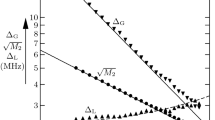Abstract
We calculate the longitudinal relaxation timeT 1 for a polarized spin-1/2 Fermi gas, in zero magnetic field, for conditions of temperatureT and densityn such that Boltzmann statistics are valid. Our results show generally thatT 1 is independent of polarization of the gas. At highT, where the thermal wavelength λ is small compared to the scattering lengtha, T 1 is proportionalT 1/2, while at lowT, such that λ is greater thana, T 1 is proportional toT −1/2.T 1 thus has a minimum at some intermediate temperature confirming the numerical results of Shizgal. Physical arguments show that the existence of the minimum does not depend on the presence of an attractive part of the potential. As an example of the expected temperature dependence we calculateT 1 numerically, via the distorted-wave Born approximation, for the case of a gas interacting via a hard core. We also computeT 1 for a spin-1/2 Bose gas, which also shows a minimum.
Similar content being viewed by others
References
B. Shizgal,J. Chem. Phys. 58, 3424 (1973).
R. Chapman,Phys. Rev. A 12, 233 (1975).
C. Lhuillier and F. Laloë,J. Phys. (Paris)43, 197; 225 (1982).
A. E. Meyerovich,Progress in Low Temperature Physics, Vol. XI, D. F. Brewer, ed. (North Holland, Amsterdam, 1987), p. 1.
R. Chapman and M. G. Richards,Phys. Rev. Lett. 33, 18 (1974).
N. Bloembergen,Nuclear Magnetic Resonance (Benjamin, New York, 1961).
C. Cohen-Tannoudji, B. Diu, and F. Laloë,Quantum Mechanics, Vol. 4 (John Wiley & Sons, New York, 19), p. 955.
C. Lhuillier,J. Phys. (Paris)44, 1 (1983).
A. Lagendijk, G. H. van Yperen and J. T. M. Walraven,J. Phys. Lett. 45, 929 (1984).
R. M. Ahn, J. P. H. W. v.d. Eijnde, and B. J. Verhaar,Phys. Rev. B 27, 5434 (1983).
F. M. Chen and R. F. Snider,J. Chem. Phys. 46, 3937 (1967).
I. Oppenheim and M. Bloom,Can. J. Phys. 39, 845 (1961).
A. Akhiezer and V. Aleksin,Dok. Akad. Nauk SSSR 92, 259 (1953).
I. P. Ipatova and G. M. Eliashberg,Zh. Eksp. Teor. Fiz. 43, 1795 (1962) [Sov. Phys.-JETP 16, 1269 (1963).
S. M. Havens-Sacco and A. Widom,Phys. Rev. B 25, 6696 (1982).
D. Vollhardt and P. Wolfle,Phys. Rev. Lett. 47, 190 (1981).
K. S. Bedell and D. E. Meltzer,J. Low Temp. Phys. 63, 215 (1986).
M. Lowe, P. C. Hammel, R. E. Ecke, K. Bedell, and M. Takigawa,Phys. Rev. B 37, 2281 (1988).
Author information
Authors and Affiliations
Rights and permissions
About this article
Cite this article
Mullin, W.J., Laloë, F. & Richards, M.G. Longitudinal relaxation time for dilute quantum gases. J Low Temp Phys 80, 1–13 (1990). https://doi.org/10.1007/BF00683111
Received:
Issue Date:
DOI: https://doi.org/10.1007/BF00683111



